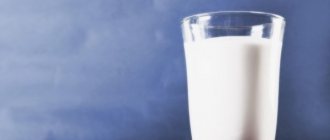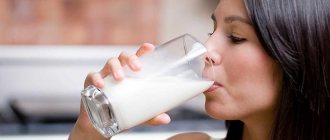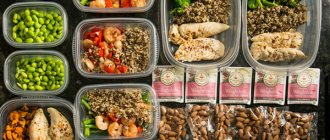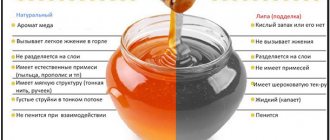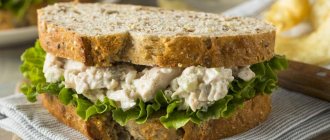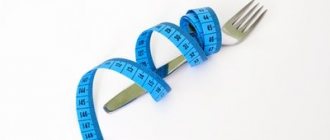The struggle for a beautiful, slender and toned body is a complex process that requires not only regular exercise in the gym, but also a properly organized diet. Many beginners, and even experienced athletes, are interested in the question: what can you eat (drink) before and after physical activity, so as not to reduce all the efforts made to “no”?
Composition and beneficial elements of kefir
To understand exactly how kefir affects an athlete’s body, it is enough to study its composition in detail.
| Chemical composition of 100 g of product | ||||
| Vitamins | Kefir 1% fat | Percentage of an adult's daily requirement | Kefir 3.2% fat | Percentage of an adult's daily requirement |
| Vitamin A | ~ | ~ | 22 mcg | 2,4% |
| Vitamin C | 0.7 mg | 0,8% | 0.7 mg | 0,8% |
| Vitamin B1 | 0.04 mg | 2,7% | 0.03 mg | 2% |
| Vitamin B2 | 0.17 mg | 9,4% | 0.17 mg | 9,4% |
| Vitamin B12 | 0.2 mg | 6,7% | 0.4 mg | 13,3% |
| Vitamin PP | 0.8 mg | 4% | 0.8 mg | 4% |
| Macronutrients | ||||
| Potassium | 146 mg | 5,8% | 146 mg | 5,8% |
| Calcium | 120 mg | 12% | 120 mg | 12% |
| Sodium | 50 mg | 3,8% | 50 mg | 3,8% |
| Phosphorus | 90 mg | 11,3% | 95 mg | 11,9% |
| Magnesium | 14 mg | 3,5% | 14 mg | 3,5% |
Kefir contains exactly as much calcium as milk. But the mineral from fermented milk product is absorbed much better.
The role of vitamins included in kefir
- Vitamin A
is a powerful antioxidant that speeds up the body's recovery process after illness and increases resistance to seasonal viruses and infections. - Vitamin C or ascorbic acid
improves immunity, speeds up metabolism and effectively fights “bad” cholesterol. - Vitamin PP
makes blood vessels and capillaries more elastic, protects athletes from skin hemorrhages in contact sports, and gives energy. - B vitamins
are actively involved in metabolism: the metabolism of fats, proteins and carbohydrates. Our heart, digestive and nervous systems need them.
Common myth: kefir causes depression. This is wrong! The product contains the amino acid tryptophan, which stimulates the synthesis of serotonin, the hormone of joy. For insomnia, neurosis, and panic attacks, neurologists prescribe their patients to take tryptophan in capsules. Or you can simply introduce a tradition instead - pampering yourself with a glass of kefir.
Action of macroelements
- Potassium maintains the water-salt balance of the body, keeps blood pressure at the desired level and is responsible for the smooth functioning of the heart muscle.
- Calcium forms bone tissue and normalizes hormonal levels. But please note: fats are needed to absorb this mineral, so low-fat kefir cannot compensate for the lack of macronutrients.
- Sodium activates the body's production of enzymes, normalizes blood pressure, and ensures smooth muscle function.
- Phosphorus supplies the body with energy, actively restores muscle fibers after training, and relieves fatigue.
- Magnesium supports the nervous system and is responsible for carbohydrate metabolism in the body.
Thus, 4 glasses of kefir per day completely meet the calcium requirement of an adult. A delicious fermented milk drink strengthens the heart, calms the nervous system, while at the same time giving strength for new achievements.
Kefir has a pronounced relaxing and calming effect. This can be helpful when preparing for exams or competitions. But on those days when maximum concentration is needed, it is better to avoid fermented milk drinks.
But the most important ingredient of kefir is lactic acid bacteria: pre- and probiotics, similar to the natural human intestinal microflora. They stimulate digestion, improve food absorption and suppress pathogenic microorganisms. The probiotic Lactobacillus kefiri can inhibit the growth of E. coli, salmonella and the bacterium Helictobacter pylori, which causes gastritis and stomach ulcers.
Useful product
Post-workout kefir is a drink that copes with several important tasks simultaneously:
- Replenishes calorie deficit (they “go away” during active sports), “returns” spent proteins to the body (“closes” the protein window);
- The benefit of kefir lies in its beneficial effect on digestion;
- Fermented milk product is a source of calcium, a microelement that is necessary for the formation of bone tissue and starting the fat burning process.
Kefir is also “convenient” for an athlete because, despite all its usefulness, it contains a minimal amount of calories - no more than 30-34 kcal per 100 g of drink. Kefir helps restore “healthy” intestinal microflora and is a natural antioxidant. This product improves metabolism and restores hormonal levels.
It is also important that two glasses of kefir contain at least 15 g of natural protein, most of which is slowly digestible casein (“dulls” the feeling of hunger for several hours).
Phosphorus, which is also contained in kefir, helps relieve fatigue, “gives” a feeling of vigor, and ensures rapid muscle recovery after active training. At the same time, kefir is absorbed three times faster than regular milk - accordingly, athletes suffering from lactose intolerance can introduce it into their diet.
The benefits of kefir after training
Regardless of the purpose of training, one of the main goals of athletes is to maintain muscle mass. That is why, after each lesson, coaches always remind their students of the need to close the protein window. And kefir comes in very handy in this matter.
In 2015, the “Protein Summit” was held in the United States with the participation of 40 scientists: nutritionists, physiologists and cardiologists. The meeting resulted in revised standards for recommended consumption of protein foods. They were increased almost 2 times. And now people who regularly engage in strength training are prescribed to consume 1.6-2 g of protein per 1 kg of weight.
100 grams of kefir contain 3 grams of protein. Let's try to think a little:
- a girl weighing 50 kg
needs 80 g of protein per day. And two 200-gram glasses of kefir will fill this need by 15%; - an athlete weighing 90 kg
needs 144-180 grams of protein, and two glasses of fermented milk drink will provide 6.5-8% of this need.
Excellent indicator! Especially when you consider that the bulk of the protein in kefir is casein. Its main advantage is long digestibility. By maintaining protein levels at a certain level for several hours, casein saves the athlete from brutal hunger after training and prevents overeating.
In addition to replenishing protein deficiency, kefir drunk after training:
- fights dehydration;
- eliminates the calorie deficit that inevitably disappears during exercise;
- saturates cells with calcium;
- heals the digestive system;
- speeds up metabolism.
If the body does not absorb milk well, this is not a reason to give up kefir. The fermented milk product contains much less lactose, which often causes flatulence, abdominal pain and diarrhea in adults.
Kefir after training for weight loss
If at the stage of gaining muscle mass, athletes can afford to drink high-calorie protein shakes after training, then when losing weight they have to count all the calories they eat.
| Nutritional value of products of different fat content (per 100 g) | ||
| Kefir 1% fat | Kefir 3.2% fat | |
| Squirrels | 3 g | 3 g |
| Fats | 1 g | 3.2 g |
| Carbohydrates | 4 g | 4 g |
| Calorie content | 40 kcal | 59 kcal |
The calorie content of kefir, even with high fat content, is not critical. One glass after training is only 118 kcal. Considering that fermented milk product suppresses hunger well, it is worth including it in the diet at least to prevent overeating.
An interesting experiment was carried out by scientists from the Australian Curtin University. They put 2 groups of volunteers on a low-calorie diet. But one group was prescribed to drink 3 cups of kefir a day, the other - 5 cups. As a result, those volunteers who drank more kefir lost more weight. Moreover, as a percentage, this group lost more of the dangerous visceral fat that accumulates in the abdominal cavity.
Tips for those who want to eat healthy after a workout
- It is best to consume carbohydrates in the form of liquids, such as freshly squeezed juices. They will be absorbed both effectively and quickly.
- The main taboo is food containing fat.
- Protein shakes do their job well. If for some reason you cannot drink them, rely on lean meat, egg whites, lean fish, and legumes.
- How do you know what your ideal protein serving should be? It's very simple: it should fit in the palm of your hand (for example, a small piece of chicken with vegetables).
- Any drinks containing caffeine are excluded.
Nutrition for women after a workout is a meal not only for effective weight loss and fat burning, but also for gaining muscle mass. If you are pursuing this goal, the ratio of proteins to carbohydrates in your evening menu should be 30 to 70.
How and how much kefir can you drink after training?
If you feel incredibly hungry right after visiting the gym, you can drink a glass of kefir right away. And after 1-1.5 hours, eat a full meal. If your fitness classes have left you the strength to go for a walk, do not deny yourself this pleasure. And after 30-60 minutes, drink 1-2 glasses of fermented milk drink.
You can drink kefir in its pure form. But it’s much tastier - an enriched drink crushed with a blender:
Option 1:
1 teaspoon of honey, 200 ml of kefir, 1 green apple without peel;
Option 2:
200 ml of kefir, 200 grams of fresh strawberries, 1 tablespoon of crushed walnuts;
Option 3:
1 egg yolk, 1 banana, 400 ml kefir. The amount of ingredients is for 2 servings.
Please note: adding sugar to kefir is a bad idea! The body uses a huge amount of calcium to digest sugar, so you won’t get any benefit from a sweet drink.
You should not get carried away with kefir, as the product has a pronounced laxative effect. The maximum benefit will come from 300-600 ml of fermented milk drink per day.
Is it possible to drink kefir before or during training?
If you don’t have the time or opportunity to have a full lunch before training, it makes sense to drink a glass of high-fat fermented milk drink an hour before training. Kefir will dull your hunger and help you find the strength to do your best in the gym. But right in the middle of a workout, it’s better to drink only clean, warm water.
What to drink after training. Pre-workout nutrition
So, in your pre-workout diet you need to:
Turn on:
- proteins; - carbohydrates.
Exclude:
- fats (or no more than 3 g).
Carbohydrates in your pre-workout diet are essential to provide energy to your muscles and brain. During exercise, the 'fuel' is burned very quickly, and it is necessary that it be glycogen, since the body cannot supply the required amounts of energy from fat (due to lack of oxygen). Proteins in the pre-workout diet will not be a source of energy; they are a source of amino acids for working muscles. As a result, immediately after training, muscle protein synthesis increases sharply. There should be no fat in your pre-workout diet because it slows down your stomach and the speed of digestion. Fatty foods stay in the stomach longer and can cause colic, nausea, and belching during exercise. The best pre-workout meals: - poultry (turkey, chicken breasts) with coarse bread or rice; - lean steak with potatoes; - an omelette made from egg whites with oatmeal. The caloric content of food before training should be normal, as at other times. It is better to eat bulk food (a large portion of salad or a bowl of soup) an hour or two before training, so that it has time to be digested and the stomach is empty. More dense food (half a plate of porridge or cottage cheese) can be eaten 30 minutes to an hour before the start of the workout. If you are training to build muscle, then 30 minutes before training, eat one large fruit with a low glycemic index (apple, pear, strawberry or any other berries) and wash it down with a protein drink (preferably whey protein). The protein calculation for this shake is as follows: 0.22 g of whey protein per kilogram of weight. For example, if you weigh 68 kg, then the cocktail (mixed with water) should contain 15 g of protein. Also, 30 minutes before training, drink a glass of strong black coffee (with sweetener, but not cream) or very strong green tea. This will help the secretion of epinephrine and norepinephrine, which mobilize fat from fat cells so that the body can use it as fuel. This way, you will burn more fat and less glucose, glycogen and amino acids during your workout. Fatigue during the training process will come much later. Your head will be clearer and you will be able to train more intensely. The effects of pre-workout coffee last approximately 2 hours. It is better not to eat anything immediately before training, since physical activity distracts from the process of digestion (rhythmic contractions of the stomach to digest food). As a last resort, if you are very hungry, you can drink a glass of protein shake or milk.
Is it possible to drink kefir at night?
The optimal scheme for using kefir by an athlete looks like this:
- 200 ml 30-60 minutes before training;
- 200-400 ml after sports;
- 200 ml immediately before bedtime.
This is where the main difference between kefir and milk lies. It takes time for the latter to be absorbed. Therefore, you can drink milk no less than 2 hours before bedtime. But the active lactobacilli in kefir do not limit the athlete: the drink can be consumed even while lying in bed, and the digestive tract will only thank you for this.
While you sleep, lactic acid bacteria will gently cleanse your intestines of waste and toxins. And if you make a glass of kefir at night a habit, within a week you will notice that your stool has returned to normal, your skin has become clearer, and your abdominal volume has decreased by a couple of centimeters. And calcium is absorbed better by our body at night, when the body is resting.
When first reporting complaints of insomnia, competent neurologists are in no hurry to prescribe sleeping pills and antidepressants to their patients, but advise drinking a glass of kefir at night. This product contains several elements that calm the nervous system: magnesium, potassium, vitamins A, C, B1 and B12.
How to choose the right kefir?
If you look closely at the table of the chemical composition of kefir, you will see an interesting thing: the content of vitamins and macroelements in a product with different fat content is almost identical. “So why eat extra empty calories if the benefits are the same?” - the loser will exclaim. And... he will be wrong.
A difference of 38 kcal per 1 glass of fermented milk drink will not make a difference. But calcium and protein from low-fat foods are absorbed much worse. Therefore, if 3.2% fat is too scary, make a reasonable compromise: buy kefir with a fat content of 2.5%.
The pursuit of low-fat dairy products very quickly leads to an increase in insulin in the blood. This entails metabolic failure, hormonal imbalances and... rapid weight gain.
Harm and contraindications of kefir after training
Alas, even such a useful product is not suitable for everyone. Kefir is contraindicated for:
- gastritis with high acidity;
- stomach ulcer;
- renal failure;
- lactose intolerance.
Some athletes calmly drink kefir after training, but drinking the drink at night results in painful heartburn for them. Most likely, in this case we are talking about reflux disease. It is not an absolute contraindication for consuming kefir. Just treat yourself to fermented milk products 2-3 hours before bedtime.
What to eat after a workout for weight loss
In this case, you need proteins and carbohydrates in a ratio of 70/30. At the same time, most of the carbohydrates are precisely those “fast” substances that we refuse, because we remember that they are more likely to turn into fat.
This option is true for those who are hungry after training, but know that sleep is still far away. But immediately at night (if classes ended closer to 21:00 or 22:00) you should eat more food containing fiber than food containing protein.
How to combine the two options?
- We need two-thirds protein and one-third carbohydrates (for those who gain muscle mass in this ratio: half - fast, half - slow).
- The former are found in sweet fruits (grapes, bananas) and juices, honey, white bread. The second is in vegetables, legumes, and cereals. There are a lot of them in amaranth bran and bread.
- The ideal option is to take both fast (milk, kefir, egg white) and slow proteins (cottage cheese, oatmeal, soy products) at the same time. As a reminder, this is only true if your goal is to gain muscle mass. When losing weight, it is recommended to focus only on polysaccharides.
If you completely deny yourself carbohydrates and protein and simply deprive yourself of the nutrients your body needs, your muscles will begin to burn. And no one wants this, because in this case the figure will not look healthy and fit.
We advise you to reconsider your opinion about what they eat after training only those who are not trying to lose weight - who are comfortable with their weight. Eating after strength training is vital. Let's explain why again:
- Before going to the gym or fitness club, we rely on energy reserves, which were formed from the carbohydrates, proteins and fats that we received before.
- Imagine that we started doing exercises - especially actively. At this moment, the metabolism accelerates - not even two, but three to four times. We spend all that we managed to get - and carbohydrates are the first to burn. Only after this does fat burning begin.
- After physical activity we feel weak and exhausted. All due to the fact that our energy supply is no longer there. It's time to give the body a new portion of proteins and carbohydrates so that it can continue to function normally.
We answered the question of what you can eat after training and in what proportion, but did not say after how long to eat. Meanwhile, this is very important - if you have a meal immediately after playing sports, the body will stop consuming fats and slow down this process. So when should the big snack time happen?
If your goal is expressive relief, and not getting rid of excess weight, you should start eating within the first 20 minutes. At this time, everything you consume (and we are talking about proteins and carbohydrates) will be spent only on building muscle mass. Not a single calorie will be wasted on fat. If you want to lose weight, you will have to wait 1-2 hours.
Next are several ready-made menus to choose from. Find what you like or create your own combinations using our recommendations.
What can replace kefir?
Other products that can support muscle tissue after workouts include:
- milk . It also quenches thirst well, has a similar vitamin and mineral composition and activates the fat burning process;
- yogurt . It perfectly restores muscle fibers, and at the same time, many athletes drink it with much more enthusiasm;
- low-fat cottage cheese . This is no longer a snack, but a full dinner that does not burden the stomach, but at the same time gives satiety for a long time.
Whey protein capsules or powder can be a convenient alternative. It contains almost no proteins and carbohydrates, and the share of protein from different manufacturers is 60-80%!
With a well-planned diet that includes eggs, meat and dairy products, you can do without sports nutrition! The same popular BCCA contains only 3 essential amino acids, while fermented milk products contain 20 of them! Nature is wise and it is worth listening to it. And huge muscles are not the result of taking protein, but those same anabolic steroids that are destructive to the whole body.
